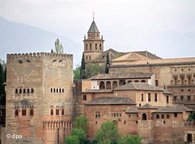"Come, Christian! Our Hearts Are Bound Together"


For some years now, the well-known German publishing house C.H. Beck Verlag, Munich, has been a bastion for Arabic literature in translation. The recent anthology Das Wunder von al-Andalus (The Miracle of Al-Andalus), edited by Georg Bossong, fills a gap in the availability of Oriental poetry in German-speaking countries.
The miracle of al-Andalus – it must be said at the outset that the edition itself is a minor miracle; its editor has succeeded in compiling an anthology distinguished both by the utmost philological accuracy and an appealing readability, a rare combination. But the true miracle is revealed by the collection itself.
Al-Andalus is the name for the period of Islamic dominance of the Iberian Peninsula. It lasted nearly a millennium, from 711 to 1614, an epoch which, for all the changes over the centuries, was largely characterized by the peaceful coexistence of the Jewish, Islamic and Christian cultures. It is not without reason that it is known as the "Golden Age".
Interaction of Arabic and Hebrew poetry
One of the virtues of this collection is that it rescues the rich poetical heritage of al-Andalus from oblivion. However, this is much more than an achievement of literary scholarship.
In his anthology Bossong lets the story of a rich poetical epoch unfold, showing how intensively Arabic and Hebrew poetry profited from one another under the conditions of al-Andalus, influencing and enriching one another and ultimately working together to blaze a path for European literature in the late Middle Ages and the modern period.
The poetry of al-Andalus was able to perform this extraordinary function because, as Georg Bossong shows, it arose from a common cultural horizon. In the foreword to the anthology the preconditions of this literature are elucidated both thoroughly and understandably.
An essential aspect of this poetry is its high degree of connectedness to tradition and its rule-bound structure. Though at first glance these essential components may tend to alienate the modern European reader, when examined more closely they point to a third aspect which allows the reader to make the leap to modern and postmodern literatures: the intertextual aspect which is especially characteristic of the poetry of al-Andalus.
A poetic compendium of love and transience
Over the centuries, poets refer back to traditional works; by taking up, modifying and producing variations on their motifs, they expand the potential of literature itself.
The selection of a total of 33 poets illustrates a remarkable spectrum, revealing not just the diversity of this poetry, but also the extremely prominent role it has always played – and will continue to play – in the Arab world.
"Come, Christian! Our hearts are bound together / though our religions may be different", Al-Ramâdî wrote back in the 11th century. Programmatic verses like these are joined by poetic treatments of the contemplation of nature and remarkably frank discussions of love, as in the poetic discourse between Ibn Zaydûn and Princess Wallâda bint al-Mustakfî, or, even more intensely, between Abû Dja'far ibn Sa'îd and Hafsa bint al-Hâdjj al Rukûniyya.
"Al-Andalus, you people, is a miracle"
The collection includes Ibn Zaydûn, King al-Mu'tamid ibn 'Abbâd, Ibn Quzmân and the great Ibn al-'Arabî, along with Shelomo ibn Gabiroll, Moshe ibn 'Ezra and Yehuda ha-Lewi on the Hebrew side.
In Georg Bossong's translation, highly readable yet faithful to the originals, and supplemented with informative notes, the anthology unfolds a poetic compendium of love and transience. This thematic scope connects these poems with the poetry of all times; however, the commitment and boldness with which the themes are treated goes far beyond what European readers are accustomed to.
"Al-Andalus, you people, is a miracle: / filled with water, shade, rivers, tall trees. / The Garden of Eden is yours alone; / never would I choose another homeland. / Thus fear not Hell: no one lands / in hellfire after Paradise!" wrote Ibn Khafâdja (1058-1139).
A poetry of cultural coexistence offers protection from the torments of Hell – that is one of the profound lessons which "The Miracle of al-Andalus" can teach us today.
Christoph Leisten
© Qantara.de 2005
Translation from German: Isabel Cole
Georg Bossong (ed.): Das Wunder von al-Andalus: Die schönsten Gedichte aus dem Maurischen Spanien (The Miracle of al-Andalus: The Most Beautiful Poems from Moorish Spain). Translated from the Hebrew and Arabic into German and annotated by Georg Bossong. Munich, C.H. Beck 2005.
Qantara.de
Al-Andalus
Jews, Muslims and the Myth of the Interfaith Utopia
According to Professor Mark R. Cohen of Princeton University, mutual resentment between Jews and Muslims is a rather new phenomenon. In this article, he investigates the status of Jewish minorities under both Christian and Muslim rule.
Maimonides – A Symbol of Integration
Respected by Muslims, Jews and Christians Alike
Maimonides was born in about 1135 in Cordoba, at the height of the "Golden Age" of the Jews and Muslims in Spain. His main theological philosophical work, the Guide for the Perplexed, he wrote in Arabic. By Stefana Sabin
Jews, Christians and Muslims
Religious Dialogues in the Middle Ages
A recently published anthology on Religious dialogues in the Middle Ages investigates the search for a religious agreement between the three monotheistic religions. By Christian Hauck
Yael Lerer
Publishing Arabic Literature in Hebrew
Yael Lerer publishes Arabic literature in Hebrew. Youssef Hidjazi spoke with the young Israeli about her interest in authors like Mahmoud Darwish, Mohamed Choukri and Huda Barakat, and about the difficulties she confronts as a publisher of Arabic literature in Israel.
www
Oriental Literature at Beck Publishing House (in German)
